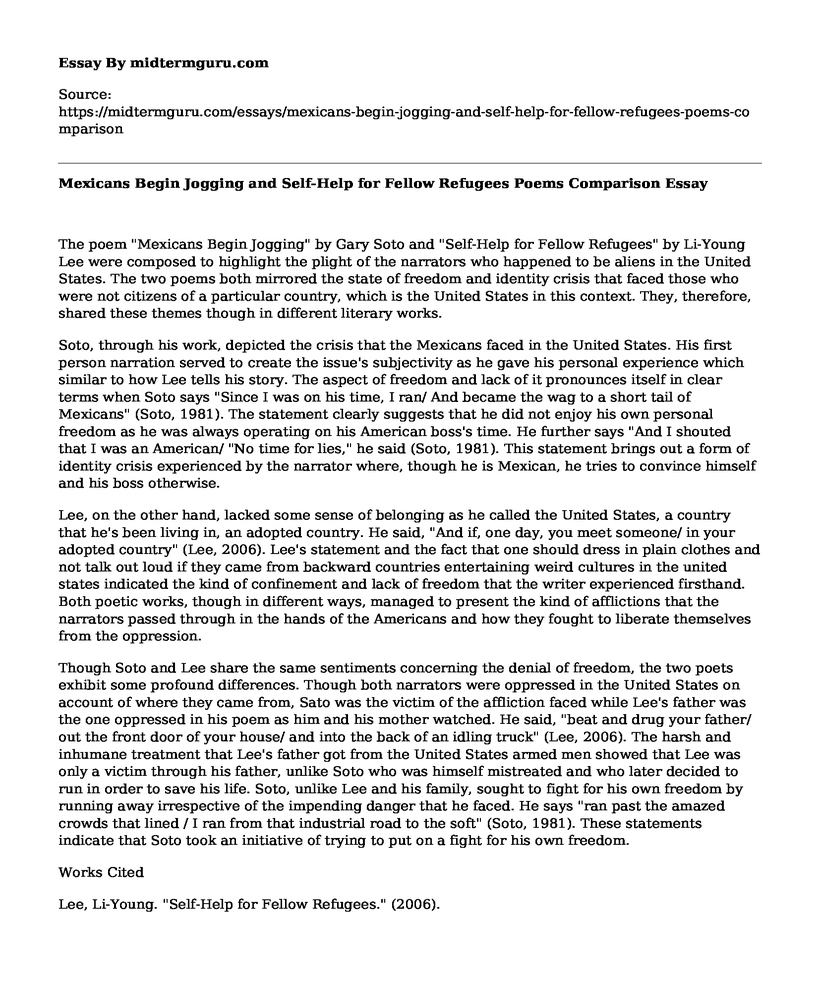The poem "Mexicans Begin Jogging" by Gary Soto and "Self-Help for Fellow Refugees" by Li-Young Lee were composed to highlight the plight of the narrators who happened to be aliens in the United States. The two poems both mirrored the state of freedom and identity crisis that faced those who were not citizens of a particular country, which is the United States in this context. They, therefore, shared these themes though in different literary works.
Soto, through his work, depicted the crisis that the Mexicans faced in the United States. His first person narration served to create the issue's subjectivity as he gave his personal experience which similar to how Lee tells his story. The aspect of freedom and lack of it pronounces itself in clear terms when Soto says "Since I was on his time, I ran/ And became the wag to a short tail of Mexicans" (Soto, 1981). The statement clearly suggests that he did not enjoy his own personal freedom as he was always operating on his American boss's time. He further says "And I shouted that I was an American/ "No time for lies," he said (Soto, 1981). This statement brings out a form of identity crisis experienced by the narrator where, though he is Mexican, he tries to convince himself and his boss otherwise.
Lee, on the other hand, lacked some sense of belonging as he called the United States, a country that he's been living in, an adopted country. He said, "And if, one day, you meet someone/ in your adopted country" (Lee, 2006). Lee's statement and the fact that one should dress in plain clothes and not talk out loud if they came from backward countries entertaining weird cultures in the united states indicated the kind of confinement and lack of freedom that the writer experienced firsthand. Both poetic works, though in different ways, managed to present the kind of afflictions that the narrators passed through in the hands of the Americans and how they fought to liberate themselves from the oppression.
Though Soto and Lee share the same sentiments concerning the denial of freedom, the two poets exhibit some profound differences. Though both narrators were oppressed in the United States on account of where they came from, Sato was the victim of the affliction faced while Lee's father was the one oppressed in his poem as him and his mother watched. He said, "beat and drug your father/ out the front door of your house/ and into the back of an idling truck" (Lee, 2006). The harsh and inhumane treatment that Lee's father got from the United States armed men showed that Lee was only a victim through his father, unlike Soto who was himself mistreated and who later decided to run in order to save his life. Soto, unlike Lee and his family, sought to fight for his own freedom by running away irrespective of the impending danger that he faced. He says "ran past the amazed crowds that lined / I ran from that industrial road to the soft" (Soto, 1981). These statements indicate that Soto took an initiative of trying to put on a fight for his own freedom.
Works Cited
Lee, Li-Young. "Self-Help for Fellow Refugees." (2006).
Soto, Gary. W. Mexicans Begin Jogging. (1981).
Cite this page
Mexicans Begin Jogging and Self-Help for Fellow Refugees Poems Comparison. (2021, May 28). Retrieved from https://midtermguru.com/essays/mexicans-begin-jogging-and-self-help-for-fellow-refugees-poems-comparison
If you are the original author of this essay and no longer wish to have it published on the midtermguru.com website, please click below to request its removal:
- Personal Insights Regarding Julia Alvarez and Harlem Renaissance Poets
- The Significance of Psychological Trauma in the Yellow Wallpaper and the Boat - Paper Example
- Literature Essay on the Old Man and the Sea: What Does It Mean to Be Strong
- Essay Sample on Beowulf, an Archetypal Hero
- Anarchy in Fight Club by Chuck Palahniuk - Literary Analysis Essay
- What This Cruel War Was Over by Chandra Manning - Literary Analysis Essay
- George Orwell's Classic Dystopian Novel: A Warning Against Dictatorship - Essay Sample







